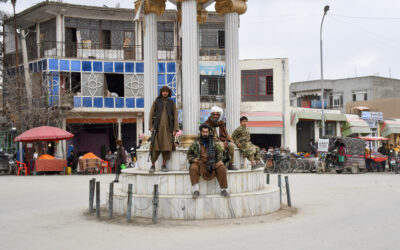
The Long Arm of China’s Security Services
SUBSCRIBER+ EXCLUSIVE REPORTING — When Chinese President Xi Jinping came to San Francisco last November to meet with President Joe Biden, Chinese pro-democracy activists in […] More
OPINION — The Chinese Nationalist Party’s (KMT) decisive win of all but five of the twenty-two municipal, city and county elections in Taiwan on November 27th, which will see Wayne Chiang (Chiang Wan-an), as the youngest mayor of Taipei and the Great Grandson of Chiang Kai-shek, sends a strong message to the DPP (Democratic Progressive Party) that there may be a real disconnect with the electorate.
President Tsai Ing-wen resigned as the DPP’s Chairperson, saying the Party didn’t meet the people’s expectation, while also questioning the quality of the candidates — Health Minister Chen Shih-chung of the DPP came in second and Deputy Taipei Mayor Huang Shan-shan, People’s First Party, came in third in the race for mayor of Taipei. Premier Su Tseng-chang verbally resigned but was asked by President Tsai to remain in his position.
Historically, these elections focus on local concerns, dealing with socio-economic and corruption issues, but President Tsai recast these elections, saying the world was watching as Taiwan defended its democracy amid military tension with China.
Although popular with the electorate, Tsai will be completing her second term as president and thus is unable to seek a third term. Vice president William Lai, reportedly a supporter of Taiwan independence, appears to be the DPP’s presidential candidate for the 2024 elections.
The elections reminded me of a 2012 private meeting with Taiwan’s former president, Ma Ying-jeou. One of the many insightful comments Ma made dealt with Taiwan’s relations with China and how he dealt with Beijing.
Ma said Beijing’s leadership was always eager to discuss a path to reunification with Taiwan, while his approach was to focus discussions on enhancing people-to-people exchanges, with more Chinese tourism to Taiwan and greater trade and investment cooperation between Taiwan and China.
Ma said he believed his strategy for dealing with China was working, given the uptick in the number of Chinese tourists and Chinese students studying in Taiwan, and the increase in trade and investment with China. Discussions of a strategy with China for the eventual reunification, he said, hasn’t happened, despite Beijing’s efforts.
This discussion also reminded me of the third Taiwan Strait crisis in 1996, when China launched missiles into waters 20 miles from Taiwan’s coast and on March 13, conducted missile tests and a joint ground, air, and naval exercise, to intimidate Taiwan, as they prepared for the first direct presidential election on March 23. China’s efforts failed, with the U.S. deploying two aircraft carrier battle groups to the vicinity of the Taiwan Strait, in support of a free election. Lee Teng-hui was elected, becoming Taiwan’s first popularly elected president.
Subscriber+Members have a higher level of access to Cipher Brief Expert Perspectives and get exclusive access to The Dead Drop, the best national security gossip publication, if we do say so ourselves. Find out what you’re missing. Upgrade your access to Subscriber+ now.
Why was China so concerned with the likely election of Lee Teng-hui, a member and chairman of the KMT and vice president to Chiang Ching-kuo, the son of Chiang Kai-shek?
In 1995, China was irate when the U.S. issued a visa to Lee to make a speech at his alma mater, Cornell University. The speech angered Beijing, given that Lee spoke of Taiwan as a democratic sovereign nation and for the first time, said it was the Republic of China on Taiwan. Lee’s reference to Taiwan as a sovereign nation concerned the leadership in Beijing, and thus launched the beginning of the Third Taiwan Strait crisis.
We know that the issue of Taiwan independence is a red line for China. Chinese President Xi Jinping made this abundantly clear at the 20th Chinese Communist Party Congress in October 2022, saying: “Resolving the Taiwan question is a matter for the Chinse, a matter that must be resolved by the Chinese. We will continue to strive for peaceful reunification with the greatest sincerity and the utmost effort, but we will never promise to renounce the use of force, and we reserve the option of taking all measures necessary. Complete reunification of our country must be realized, and it can, without doubt, be realized.”
Singapore’s former prime Minister, Lee Kuan Yew, who met often with senior Chinese leaders, wrote in his memoirs published in 2000, that no Chinese leader can survive if he is seen to “have lost Taiwan.” He goes on to say “that the U.S. may be able to stop China from any force for another 20 to 30 years. With that time, China is likely to develop the military capability to control the Taiwan Strait. It may be wiser, before the military balance shifts to the mainland, to negotiate the terms for an eventual, not an immediate, reunification.”
Lee Kuan Yew had great credibility with seniors in the U.S., to include President Ronald Reagan and a man I worked for, CIA Director Bill Casey, who never missed an opportunity to meet with Prime Minister Lee.
The recent local elections in Taiwan may be a message that the 24 million people who live there want to preserve the status quo as Taipei and Beijing pursue the goal of peaceful reunification.
Read more expert-driven national security perspectives, insights and analysis in The Cipher Brief
Related Articles

SUBSCRIBER+ EXCLUSIVE REPORTING — When Chinese President Xi Jinping came to San Francisco last November to meet with President Joe Biden, Chinese pro-democracy activists in […] More

SUBSCRIBER+EXCLUSIVE EXPERT PERSPECTIVE — More than two years after its withdrawal from Afghanistan, the U.S. still does not have a clear way forward in the […] More

SUBSCRIBER+ EXCLUSIVE REPORTING — Ukrainians greeted Saturday’s long-awaited House passage of $60.8 billion in aid with justifiable jubilation. For months, their soldiers, civilians, and political […] More

SUBSCRIBER+ EXCLUSIVE REPORTING — A race for control of space is underway, and just as on earth, the U.S. and China are the top competitors. […] More

SUBSCRIBER+ EXCLUSIVE REPORTING — For nearly a week, the Middle East and much of the world were on a knife’s edge, waiting for a promised […] More

BOTTOM LINE UP FRONT – Less than one week after Iran’s attack against Israel, Israel struck Iran early on Friday, hitting a military air base […] More
Search